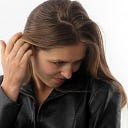Ocean Air
Lituya Bay is a voluminous inlet with a narrow mouth out to the ocean swell. The mouth is famously hazardous: on the ebb tide, boats too near the mouth have been swept miles out to sea. Even on the flood, the confluence of the strong current with waves and wind capsized so many in LaPerouse's 1780s expedition that the island in the center of the bay is named Cenotaph after the monument he erected in their memory.
Even in more recent memory, strange things have been known to occur: someone Rick knows once waited for the slack before a scheduled flood tide for hours but found it flowing only out: some massive calving of the three glaciers at the head? There's also a fault line there. A tidal wave strikes every thirty years, regular, except that we're now forty years overdue.
Fortunately, Charley is an excellent skipper, so I don't notice any special turbulence as we enter the bay, only the grateful calm. I've been lying on my back, counting breaths and singing every song I know for the last seven hours or so, seasickness having taken and kept me not five minutes after boarding the Ocean Aire.
"Oh yeah, everybody gets sick on this boat," Charley reassures Rick as he ventures back into the cabin looking shaky. "It's something about the way it rolls."
Someone found a two-years stale bag of Cheerios in the Sunnyside totes, and I pass them back and forth across the gallery table to Ryan, who is laying silent and pale on the other bench.
So the inside of Lituya Bay is perhaps doubly magical when I'm suddenly well enough to sit up and see it. We've arrived at golden hour on an unusually beautiful day. The wind blows chop from the ocean swells outside, but it's flat calm in here.
On the north side of the mouth, a long sandy beach stretches, ready for exploring. To the south, two rounded hills puerilely named the Paps serve as easy navigational features. Both sides build gradually to enormous white-capped mountains at the head of the bay, the north with a lovely long flat spur called the Railroad that begs to be hiked.
We scan the beach for campsites. We're looking for someplace flat enough for tents and a boat pullup, with nearby fresh water, and hopefully not too much grass, since that's what bears are eating this time of the year. Charley hands me a pair of binoculars to scout likely creek outlets. He's using his own to pick out otters and to speculate on the gold content of the massive mineral slides.
After much discussion and the release of our shrimp pot, we pick a site on the north side that looks across to Cenotaph and keeps our shrimp pot buoy in view. Two trips to ferry bags, totes, and ourselves, and we're on the ground, on our own, at sunset on the unknown beach.
Previous: Waiting | Next: First Camp
